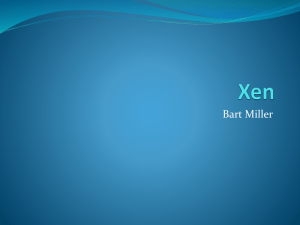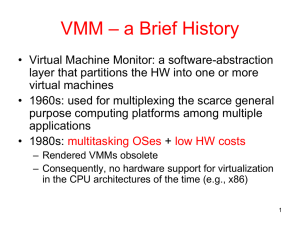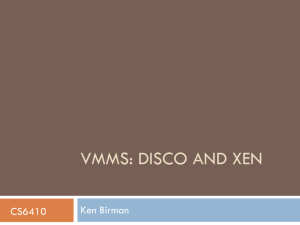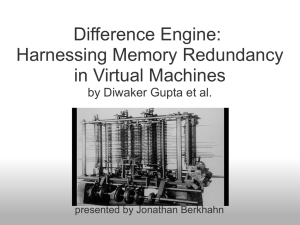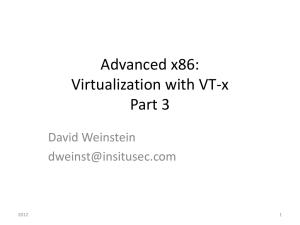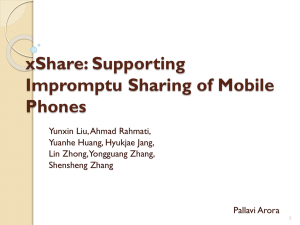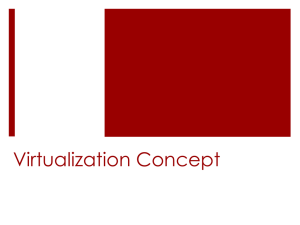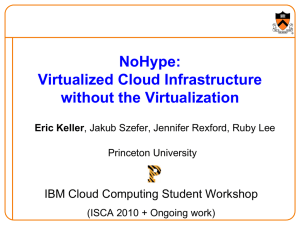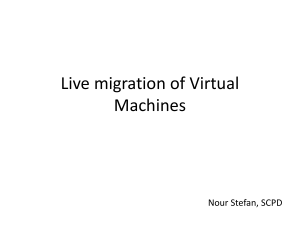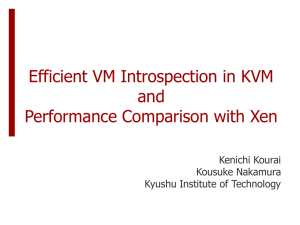OS Slide Master
advertisement
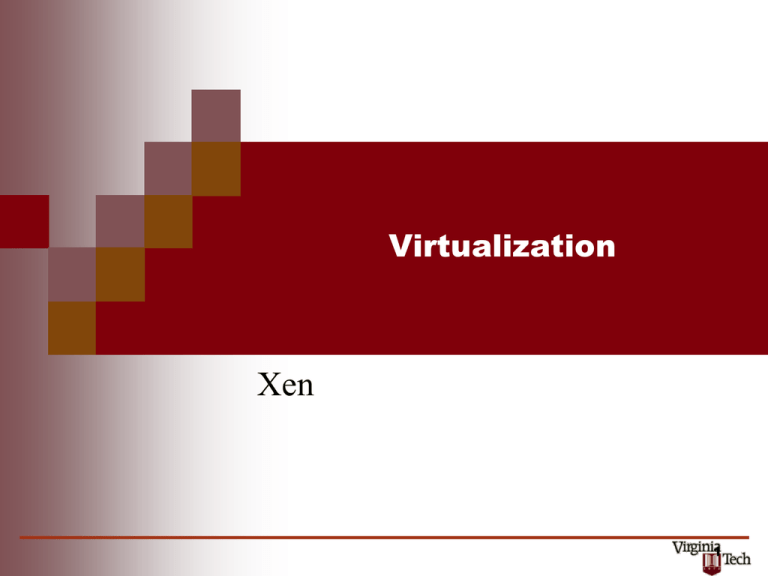
Virtualization Xen 1 Xen and the Art of Virtualization What is Xen? Xen is a is a virtual machine monitor (VMM) that allows multiple guest operating systems to run on the same computer hardware Allows for the increase of server utilization and consolidation. More processes can be run on less hardware CS 5204 – Fall, 2009 2 Xen and the Art of Virtualization Design Principles Support for unmodified application binaries Support for multiple full multi-application OS Each guest can contain a complex sever configuration Use paravirtualization Allows user-level applications to be run without being modified Needed to obtain performance and resource isolation on architectures that do not facilitate virtualization (ie x86) Hide effects of virtualization from guests Each guest OS does not know about other guests CS 5204 – Fall, 2009 3 Xen and the Art of Virtualization Paravirtualization Interface presented to a guest OS is not identical to underlying hardware In some cases it is beneficial for the host to see real and virtual resources Allows VMM to correctly handle instructions in architectures that do not support full virtualization (such as x86) Providing real and virtual time can allow a guest OS to handle time sensitive tasks more efficiently Drawback: guest OS must be modified CS 5204 – Fall, 2009 4 Xen and the Art of Virtualization Structure of a Xen system The Xen hypervisor provides an abstraction layer that sits between system hardware and one or more guest operating systems Each guest OS is executed within its own virtual machine, called a domain Domain0: has special management privileges and is used to create the other domains DomainU: contains one guest OS CS 5204 – Fall, 2009 5 Xen and the Art of Virtualization Xen Hierarchy Levels of a Xen system CS 5204 – Fall, 2009 6 Xen and the Art of Virtualization The Virtual Machine Interface: Memory New page tables are allocated from a guest OS memory reservation and registers it with Xen All subsequent writes to the page table are validated by Xen This ensures that a guest OS only writes to tables it owns, and is isolated from other guests CS 5204 – Fall, 2009 7 Xen and the Art of Virtualization The Virtual Machine Interface: CPU An operating system is typically the most privileged entity of a system With Xen, the hypervisor sits between a guest OS and the CPU The hypervisor is the most privileged entity in a Xen system Xen uses protection rings to allow the hypervisor to be more privileged than a guest OS CS 5204 – Fall, 2009 8 Xen and the Art of Virtualization The Virtual Machine Interface: CPU • x86 privilege rings • Typical: – – – • Xen: – – CS 5204 – Fall, 2009 OS runs in ring 0 Applications run in ring 3 Rings 1 and 2 unused Hypervisor runs in ring 0 Guest OS runs in ring 1 9 Xen and the Art of Virtualization The Virtual Machine Interface: I/0 Xen provides simple device abstractions This helps realize goal of protection and isolation Data sent to and from each domain through the hypervisor I/O descriptor rings are used for asynchronous data transfer CS 5204 – Fall, 2009 10 Xen and the Art of Virtualization I/O Descriptor Rings CS 5204 – Fall, 2009 11 Xen and the Art of Virtualization Performance In summary, Xen performs well Multipile domains can be hosted without any noticeable loss of performance by end user Xen and the Art of Virtualization identifies a scalability goal of 100 domains on modern (c. 2003) server-class hardware Tests demonstrate that 128 domains can be run with only 7.5% loss of throughput relative to standalone Linux CS 5204 – Fall, 2009 12 Xen and the Art of Virtualization Performance CS 5204 – Fall, 2009 13 Xen and the Art of Virtualization Performance Running multiple web servers: CS 5204 – Fall, 2009 14 Xen and the Art of Virtualization Demonstration Xen is an open source product that is easy to install and configure on Linux Requires a modified Linux kernel Xen provides a live CD which can be used to try the hypervisor without installing any software CS 5204 – Fall, 2009 15 Xen and the Art of Virtualization Questions? CS 5204 – Fall, 2009 16
